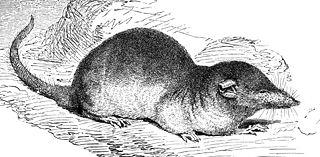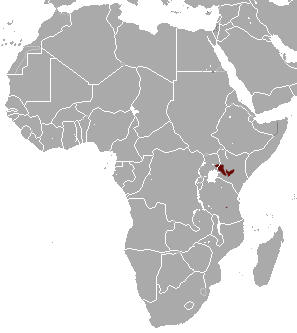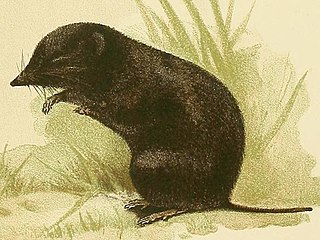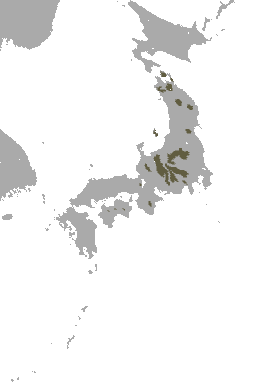
The order Insectivora is a now-abandoned biological grouping within the class of mammals. Some species have now been moved out, leaving the remaining ones in the order Eulipotyphla within the larger clade Laurasiatheria, which makes up one of the basal clades of placental mammals.

Shrews are small mole-like mammals classified in the order Eulipotyphla. True shrews are not to be confused with treeshrews, otter shrews, elephant shrews, West Indies shrews, or marsupial shrews, which belong to different families or orders.

A tenrec is any species of mammal within the afrotherian family Tenrecidae, which is endemic to Madagascar. Tenrecs are a very diverse group; as a result of convergent evolution some resemble hedgehogs, shrews, opossums, rats, and mice. They occupy aquatic, arboreal, terrestrial, and fossorial environments. Some of these species, including the greater hedgehog tenrec, can be found in the Madagascar dry deciduous forests. However, the speciation rate in this group has been higher in humid forests.

The family Talpidae includes the moles who are small insectivorous mammals of the order Eulipotyphla. Talpids are all digging animals to various degrees: moles are completely subterranean animals; shrew moles and shrew-like moles somewhat less so; and desmans, while basically aquatic, excavate dry sleeping chambers; whilst the quite unique star-nosed mole is equally adept in the water and underground. Talpids are found across the Northern Hemisphere of Eurasia and North America, and range as far south as the montane regions of tropical Southeast Asia.

Mountain Elgon is an extinct shield volcano on the border of Uganda and Kenya, north of Kisumu and west of Kitale. The mountain's highest point, named "Wagagai", is located entirely within Uganda. Although there is no verifiable evidence of its earliest volcanic activity, geologists estimate that Mount Elgon is at least 24 million years old, making it the oldest extinct volcano in East Africa. The mountain's name originates from its Maasai name, Elgonyi.

The white-toothed shrews or Crocidurinae are one of three subfamilies of the shrew family Soricidae.

The genus Crocidura is one of nine genera of the shrew subfamily Crocidurinae. Members of the genus are commonly called white-toothed shrews or musk shrews, although both also apply to all of the species in the subfamily. With over 180 species, Crocidura contains the most species of any mammal genus. The name Crocidura means "woolly tail", because the tail of Crocidura species are covered in short hairs interspersed with longer ones.

Jackson's mongoose is a mongoose species native to montane forests in Kenya, Uganda and Tanzania. It appears to be rare and has been classified as Near Threatened since 2008.

Soricomorpha is a formerly used taxon within the class of mammals. In the past it formed a significant group within the former order Insectivora. However, Insectivora was shown to be polyphyletic and various new orders were split off from it, including Afrosoricida, Macroscelidea, and Erinaceomorpha, with the four remaining extant and recent families of Soricomorpha shown here then being treated as a separate order. Insectivora was left empty and disbanded.

Myosorex is a mammal genus in the Soricidae (shrew) family. The genus, collectively referred to as the mouse shrews, contains these species:

The Shinto shrew is a species of shrew of the genus Sorex that lives only on the islands of Japan. It is a mole-like mammal with a pointed snout, very small ears, and a relatively long tail. Like most shrews, it is tiny, has poor eyesight, and a very good sense of hearing and smell which it uses to locate its prey, mainly insects.

The Aberdare mole shrew is a species of mammal in the family Soricidae endemic to the Aberdare Mountains in Kenya. Its natural habitat is tropical high-elevation bamboo and grassland.

The Mount Kenya mole shrew is a species of mammal in the family Soricidae endemic to Mount Kenya in Kenya. Its natural habitat is tropical high-elevation bamboo and grassland, particularly the bamboo-belt of Mount Kenya and the adjacent heath and grassland.

The forest shrews are the members of the genus Sylvisorex. They are mammals in the family Soricidae and are found only in Africa. The genus name comes from the Latin world "silva" which means "forest" and "sorex", which means "shrew-mouse". This reflects the nature of these shrews, which prefer forest habitats. All shrews are carnivorous, and eat continually to satisfy their high metabolic rate.

According to the current taxonomy, the Myosoricinae are a subfamily of shrews. As such, they form one of three main types of shrews, the other two being the red-toothed shrews and the white-toothed shrews. They are the only one of the three to be found exclusively south of the Sahara Desert, and so they have been described in English as the African shrews, but also many white-toothed shrews are in Africa and therefore this term is more generally used for shrews from Africa in general. The subfamily has three genera and 20 species:
A mole shrew is a shrew that resembles a mole. Species with this name include:

The East African montane forests is a montane tropical moist forest ecoregion of eastern Africa. The ecoregion comprises several separate areas above 2000 meters in the mountains of South Sudan, Uganda, Kenya, and Tanzania.
Represented by a single specimen, the Mount Elgon mole shrew is a species of African mole shrew known to date only from the ericaceous zone of Mount Elgon in Western Kenya. In 1984, a specimen of the genus Surdisorex was collected on a footpath at 3,150 m (10,330 ft) of the Kenyan slope of Mount Elgon. It was described as the third member of the genus Surdisorex by Kerbis Peterhans in 2009. On the basis of skull length measurements, Surdisorex schlitteri is intermediate between S. norae and S. polulus in size. The scientific name honors Duane Schlitter, in recognition of his substantial contributions to the understanding of African small mammals and his longstanding support of Kenyan scientific research. The Mount Elgon mole shrew is listed as "data deficient" because it is only known from a single specimen.















